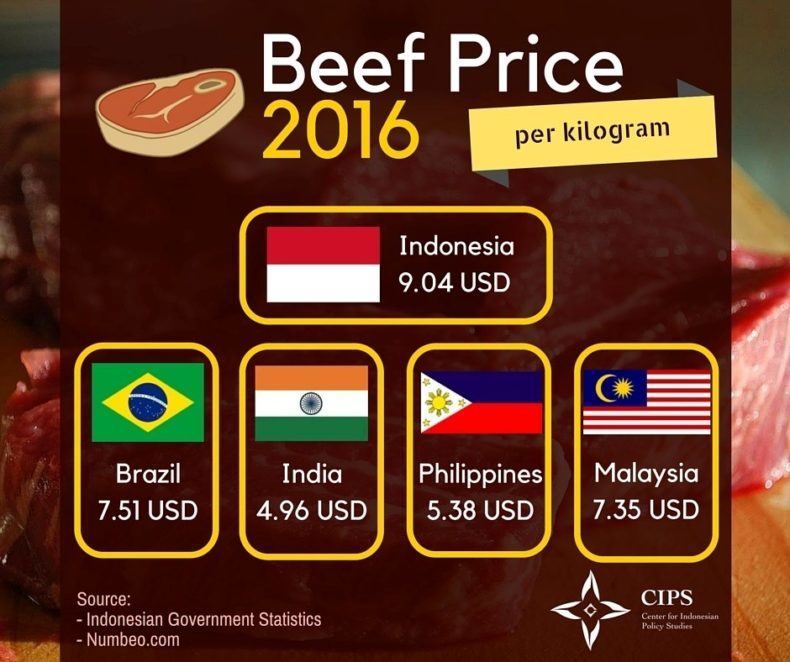Ramadhan has come…
6th of June marked the beginning of the fasting month of Ramadhan in 2016. For the next four weeks, every evening after sunset, special meals are being prepared when friends and families break the fast together. Everybody enjoys get-togethers and shares delicious food. Tables bend under the weight of sweet desserts, rice, meat, and fruits. There is always more food on the table during Ramadhan—to be savoured and to be shared. When Idul Fitri comes at the end of Ramadhan, people will celebrate it with even more special meals to welcome in the holiday after the fasting period.
…and food prices are rising
Since consumption goes up, it is not surprising if Ramadhan is also the month when Indonesians lament steep increases in food prices. Sadly, as poor people spend nearly three-quarters of their monthly income on food, those increases always hit the poorest the hardest. About 10% or 28 million out of 250 million Indonesians feel this predicament as they live below the poverty line.
As the poor are struggling to fulfil their needs for food, the numbers of stunted children and malnutrition cases increase. A recent report by the UN World Food Programme states that national prevalence of stunting among children under 5 years of age increased from 36.8% (2007) to 37.2% (2013). Meanwhile, the prevalence of underweight children also went up from 18.4% (2007) to 19.6% (2013). Furthermore, 58 districts in 8 different provinces are severely vulnerable to food insecurity.
Food prices could be much lower if it was not for serious import restrictions which are part of the government’s food self-sufficiency policy. By limiting imported agricultural products from entering the country, the government aims to protect Indonesian farmers from direct competition with foreign products. The government hope that this approach will ensure that domestic food products remain dominant in the market and thus secure the farmers’ income and livelihood.
This policy, however, brings dreadful consequences as the prices of domestic food items become highly inflated despite their availability on the international markets. Just take beef as an example. Currently, beef in Indonesia can cost up to USD 9.04 per kg or 20% more than during Ramadhan last year. Meanwhile, beef in India and Brazil (two of world’s largest beef producers) is sold at USD 4.96/kg and USD 7.51/kg respectively. Looking at Indonesia’s neighbouring countries, beef consumers in Malaysia only pay USD 7.35/kg, while in the Philippines beef is even cheaper at USD 5.38/kg.

The solution would be the import of cheaper beef but this is easier said than done as it involves a number of restrictions. In addition to an import tariff of 5%, the government also imposes non-tariff measures (NTMs) such as food safety regulations as well as import quota and licensing. These NTMs draw criticism from the international community. The US, Brazil, and New Zealand have all registered official complaints with the World Trade Organization. The US complained about Indonesia’s overly complex licensing procedures resulting in a lengthy process that could take 9 months instead of 45 days as legally mandated. Brazil protested Indonesia’s decision to stop the import of Brazilian beef. Indonesia claims that Brazilian cattle may be infected with foot and mouth disease (FMD). Brazil argues, however, that its beef comes from FMD-free states and regions. Meanwhile, New Zealand expressed their objection against Indonesia’s import quota system that makes it mandatory for all importers to buy a minimum 3% of their total purchase domestically. All of these together make imports of beef to Indonesia difficult and costly.
With the supply of imported beef dwindling, local beef companies are of course rejoicing. Holding a limited number of import licenses, they are able to manipulate the supply and control beef prices in the market. Last April, the Indonesian Competition Commission (KPPU) fined 32 beef companies for cartelization and unfair competition as they hoarded stocks and deliberately under-utilized their import quota. But beef prices are still rising in the market.
What’s more, beef is just one example of what is happening to several strategic food items such as rice, sugar, chicken, cooking oil, and onions. These items all have high in demand in Indonesia and their inflated prices affect the poorest Indonesians most. More than a million Indonesians fell below the poverty line when rice prices increased in 2015 despite all of these being internationally available at a much more affordable price.
What to do?
With food security under threat, it is senseless to maintain a self-sufficiency policy in Indonesia, especially when the agricultural sector is still riddled with issues such as low productivity, environmental conflicts, and insufficient number of skilled agricultural workers. The Indonesian government should not be led by nationalistic sentiments of pride but act rationally and start focusing on food security for its people. The NTMs that impede food security must be reviewed and revoked if they are causing undue harm. Food import quota must be removed and the licensing system should simply focus on speedy and reasonable quality checks.
The Indonesian government must start embracing international trade in food as part of its commitments to the WTO and to the ASEAN Economic Community (AEC) and even to the yet-to-be-established Trans-Pacific Partnership. It is high time to return Ramadhan to its rightful place as a time of celebration, not anxiety due to increasing food prices.


